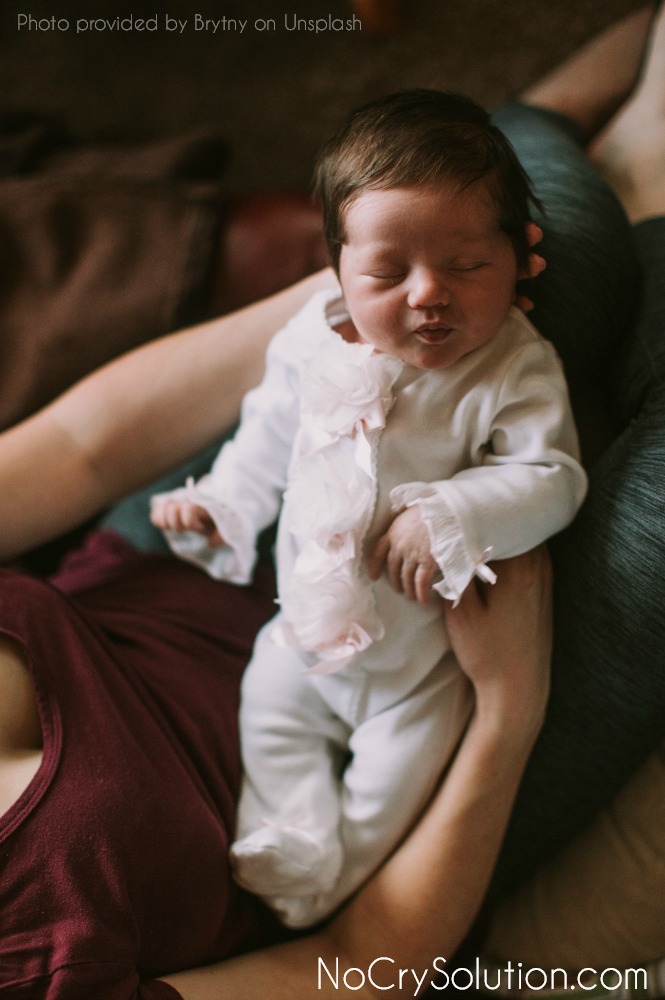By Elizabeth Pantley, author of The No-Cry Sleep Solution for Newborns ~~~
So that you can be on the lookout for possible sleep issues down the road, let’s cover some of the reasons why a good sleeper suddenly begins to resist sleep or to wake up more often:
~ Newborn sleepiness fades away.
Infants are wired to need mass amounts of sleep. If you read your newborn’s cues properly and provide a perfect sleep environment they will sleep and sleep . . . and sleep. But as the months pass, your baby’s biology dictates the need for fewer naps, fewer hours of sleep, and longer awake periods. Many babies sleep much differently as newborns than they do after they pass through the “fourth trimester.”
~ Your newborn infant becomes a baby-driven to learn.
Once infancy passes your baby enters the conscious world and develops an all-encompassing desire to learn about everything. There are so many new things to see, hear, taste and explore and many milestones to the summit. When your baby’s eyes peek open (day or night) the world beckons: “Wake up, kiddo! You have things to do!”
~ Major milestones can cause 24-hour upheaval.
For many babies leaps in development affect daytime hours and sleep time, as well. When your baby is learning to sit, crawl, cruise the furniture, climb, walk, and run – along with cognitive growth that has your baby suddenly understanding how to push a button or stack blocks keeps his brain and body far too busy to sleep.
~ The teething monster enters the picture.
Darn if it isn’t the worst timing ever! Around five to seven months of age, babies will begin teething – just when you and your baby have graduated from the newborn stage and life is settling into your new normal. Teething can be difficult and painful, and it is a well-known sleep-disrupter. Teething can also affect your baby’s mood and sleep for many weeks before a tooth even emerges because of growth and movement occurring under the gum line.
~ Swaddling loses its value.
If your newborn was calmed by swaddling, there will come a day when it suddenly becomes restrictive and annoying to your ever-active baby. Or you’ll have to stop swaddling because your little one wiggles so much in her sleep you risk a wad of blankets wrapped in all the wrong places. Yet a baby who has slept well when swaddled will often struggle to fall asleep without it.
~ Your baby gets smarter.
As babies move out of infancy they become masters at figuring out their parents. Your little one learns that calling for you in the night or poking you in the ribs brings warm milk and a lovely cuddle.
~ Good habits formed in infancy become problems for you later.
It’s a blessing to your newborn and to you when you hold your little one in a sling or your arms for naps. There’s nothing sweeter than the sleepy, soft breathing of a teeny-tiny bundle in your arms. You can take a walk or complete household chores with your baby gently swaying in the sling. But when that bundle is nine months old and weighs twenty pounds, yet still wants to spend every nap in your arms, you may find that impossible, so things must change.
~ And add one more possibility to this list …
It’s the mystery reason that even Sherlock Holmes cannot deduce. That’s when everything seems to be right, but sleep is so wrong, and you cannot pinpoint any logical reason for the disruption. Chalk it up to the complexity of little human beings.
Elizabeth Pantley is a mother of four, grandmother, and author of the bestselling book, The No-Cry Sleep Solution for Newborns
plus 8 other books in the No-Cry Solution Series, which helps Moms and Dads through all key stages of parenting. Visit her at nocrysolution.com
